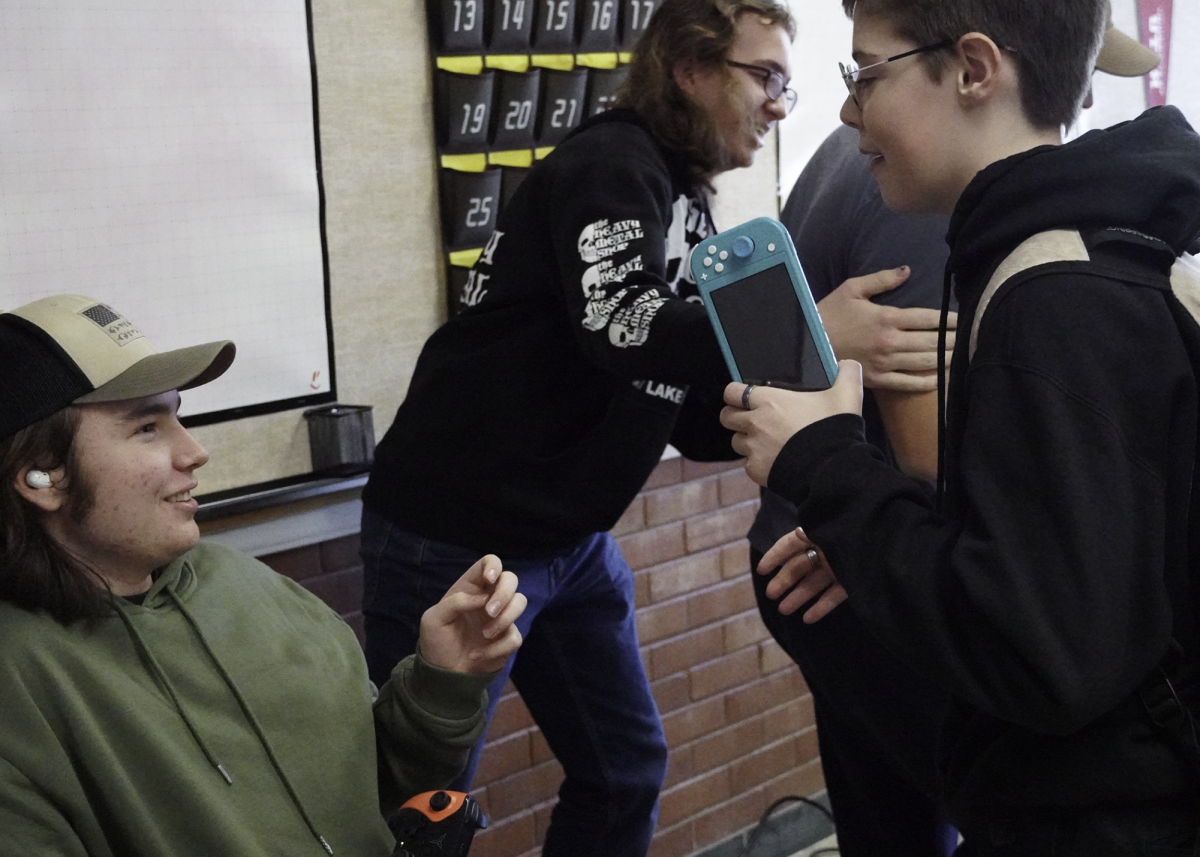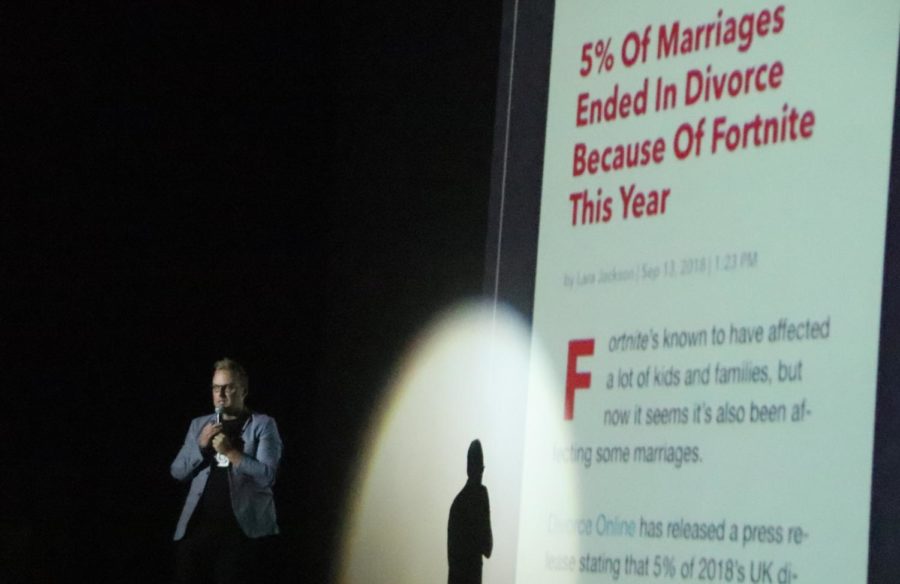Kartchner Urges Teens To Use Phones For Good
Collin Kartchner speaks to Highland students at back to school assembly.
September 5, 2019
Collin Kartchner is not trying to take your phone. He does not want you to take a hammer and smash it to bits. He does not want your parents to buy you a flip phone for Christmas.
But he does want you to realize that phones aren’t just harmless gadgets that fit in the palm of your hand.
On August 20th, Kartchner performed three compelling assemblies at Highland, speaking out about the dangers behind teenagers not knowing how to properly manage smart phones.
Two assemblies took place during the school-day geared towards the younger student audience. That night, a parent-directed assembly took place in the evening and was aimed towards parents and how they can assist in the fight to keep technology from becoming dictators of human life, based on his platform #savethekids.
He found his way to Highland thanks to members of the ParentTeacher Association (PTA )who had heard him speak at other schools or seen his TED talk and immediately referred him to principal Chris Jenson. When he started the assembly, he stated his message with an abundant amount of energy; this had the entire audience listening to the speech, whether or not their views aligned with his.
At the parent meeting, Jenson commented on the oddity of having a captivated audience of students. It is a common occurrence to find yourself seated in the middle of the auditorium, encircled by the illumination of a few dozen phones that have been dimmed by their users in hopes of being more inconspicuous. At this assembly that disappointing number of screens was decreased by an astonishing amount. Clearly, this message was being heard by the student body.
Kartchner has been traveling around the country since April 2018 talking to schools, parents and communities about the ability to have responsibility and control over technology, especially in young adolescent adults. Before he was speaking out about the dangers of social media, he was a social media personality who had an account based on humor. After a life-shattering event he used his large following to spread a message that he truly believes in.
“The irony is that I’m talking about is on social media,” Karchner said, “but that’s where the danger is, that’s where the kids are, that’s where the parents are.”
He takes the initiative not to rail upon technology and turn to shaming iGen, like so many adults tend to do in such speeches. He instead promotes the responsibility, censorship and healthy dosage that comes along with being a member of Gen Z or raising your Gen Z child. He doesn’t want kids to throw away their phones, he just wants to make them aware of the unhealthy habits that are so easy to fall into. Kartchner encourages using technology for the positive outcomes it can provide.
“Too many of us are consumers,” Karchner said. “I want you to be creators.”
The lack of shaming and the encouragement of creativity is likely the reason why he has caused so much change and become so successful.
This mission began after a devastating event in Kartchner’s life, it’s something that is happening all across the globe. Someone he had grown close to years before had committed suicide, a young girl around 20 who had her entire life ahead of her. Kartchner found out the devastating news from the girl’s mother. When he asked what happened, the mother responded by saying that she had made a terrible parental mistake and handed her daughter a “loaded gun.” He was confused until the mother pulled out her phone, held it in her hand, and repeated, “I handed my child a loaded gun.”
Soon, Kartchner responded by taking away his own three children’s phones and other devices.
“The kids lost their minds for about 10 minutes like crackheads without pipes,” Kartchner said.
Staying technology free is one of the hardest challenges that people growing up have to face. Being wise with technology can be even harder than cutting it out of your life. Education on how teens can use phones for good and how to use them responsibly is the end goal. In Karchner’s view, the lack of education on phone use is the fault of the adults who so willingly bought them these devices.
“We’re (parents) giving our kids keys to motorcycles without any training,” Karchner said.
There were several photos displayed throughout the presentation of a child sitting in-between their two parents fighting for attention, as mom and dad are laser focused on their screens. It has been proven that babies need physical contact and emotional engagement for healthy development, this need does not reach a cut-off at the age of six, this need is continual throughout adolescence. The development of technology has completely changed communication, people are more connected than ever through gaming, texting and social media, but a stand-still in face-to-face interaction came along with these other communication methods.
“We know that parents are working at neck-break speeds to give their children what they think they need and not giving them what they really need,” Karchner said.
He encourages a simple solution to this problem. Eight hugs a day, eight seconds each. It can be uncomfortable to hug someone for eight seconds, it can feel longer than anything in the world, but it something both a person’s mind and body require to be happy and being happy is getting more and more challenging as social media continues to rise in popularity. It was a strange experience to see an entire auditorium of teenagers hugging it out during the assembly, but the awkwardness was quickly replaced with laughter and smiles.
“Two-out-of-three people who use Instagram are miserable,” Karchner said. “It’s (social media) turned into this huge glob of toxic perfectionism.”
Social media is not only a device of evil, it has been used for good by many kids, and this is what Karchner is promoting should be the goal of using these digital platforms. Students are able to attain scholarships, express creativity and organize service projects on a much larger scale than ever before because of how easy it is to spread the word to large groups of people.
“I think, use it for good. I’m not the guy who’s saying let’s all be Amish and get rid of it (social media),” Karchner said. “We have this amazing platform to connect with millions of people and you can either use that to open yourself up to horrible amounts of scrutiny…or you can use that platform…to go out and impact change.”
Karchner and his team aren’t stopping at school assembly’s and community meetings. They are taking their message to congress to try and get tighter reforms on tech and app usage. The companies that produce apps like Instagram, Snapchat, and Tiktok decide for themselves how old clients have to be in order to safely use these apps. Most apps tend to be rated 12+, the content within these apps is often much more mature than what would be considered appropriate for viewing in film and other rated entertainment fields. Karchner is trying to get a board to rate these apps so that tech companies don’t exploit the mental health of young adults in order to gain profit.
Karchner and his team will continue speaking until they see a change in the way tech is controlled.




























